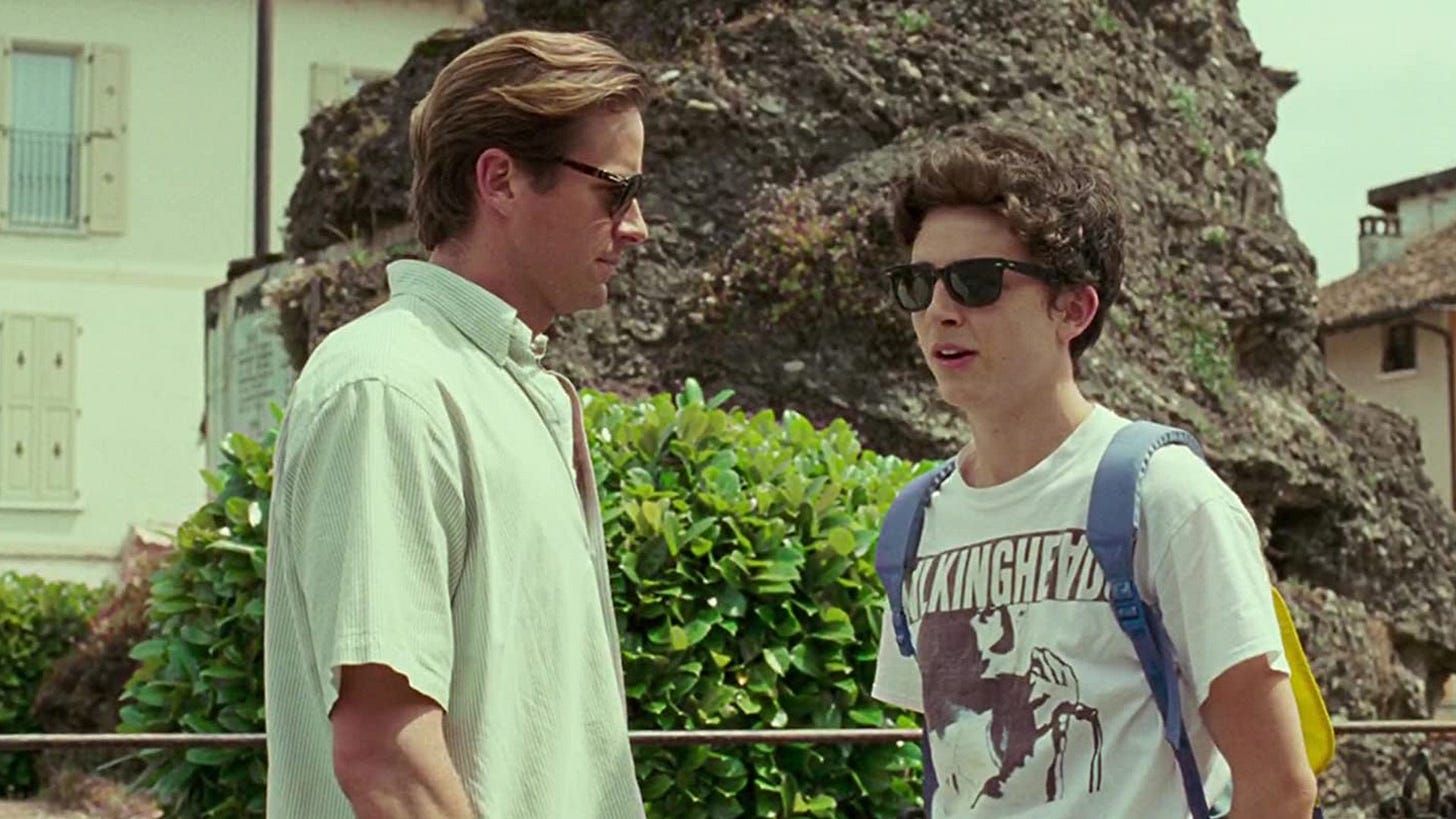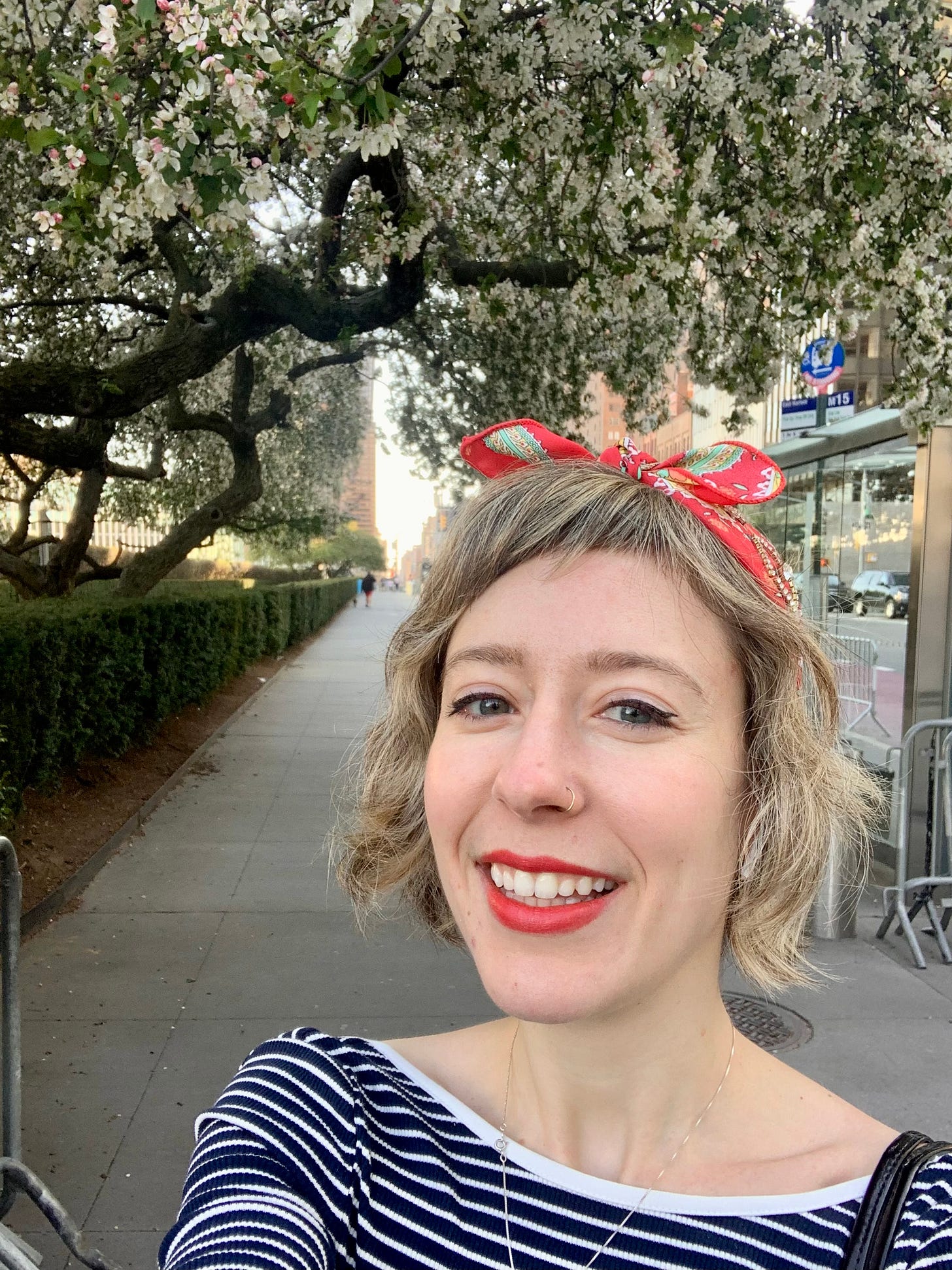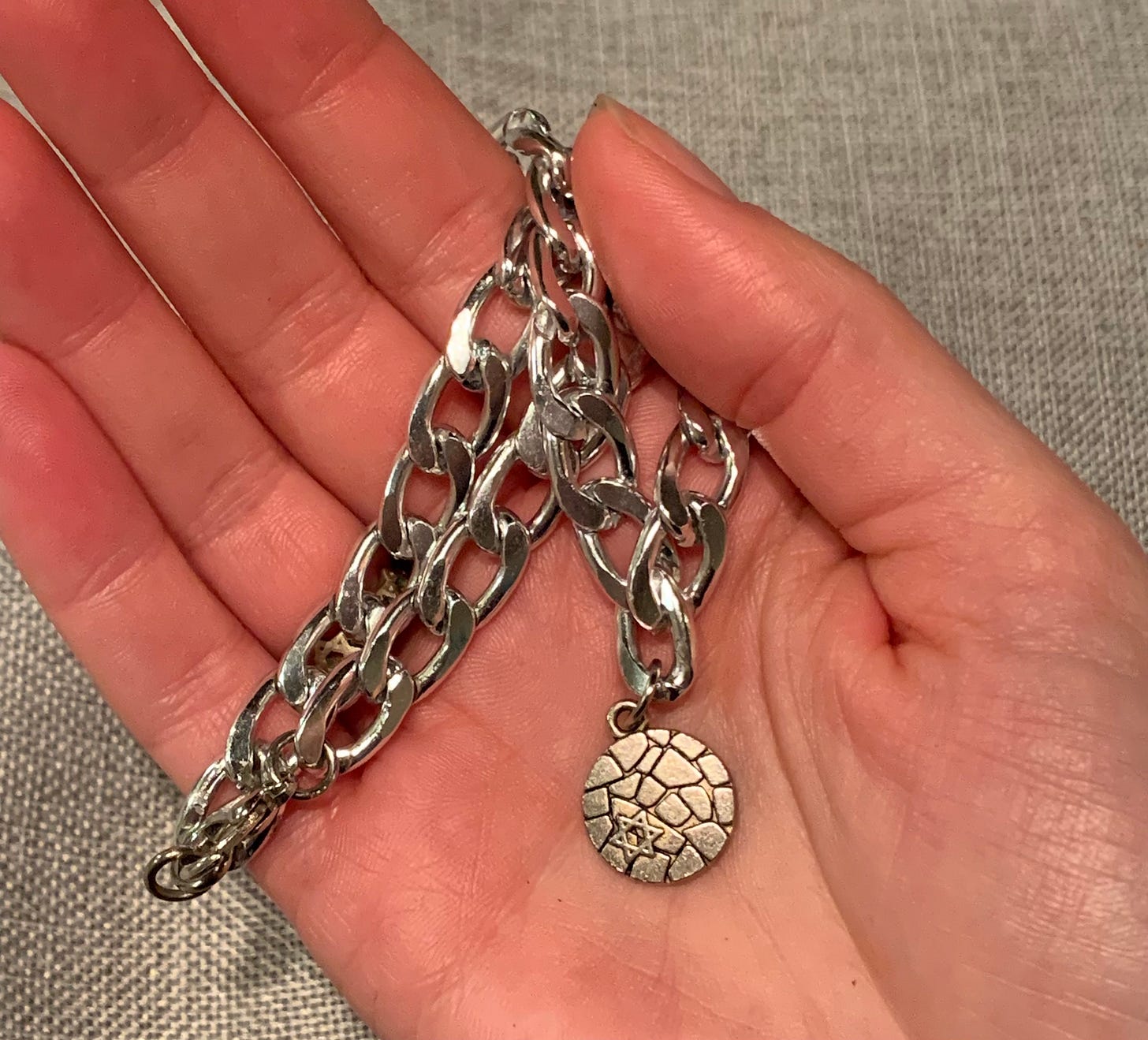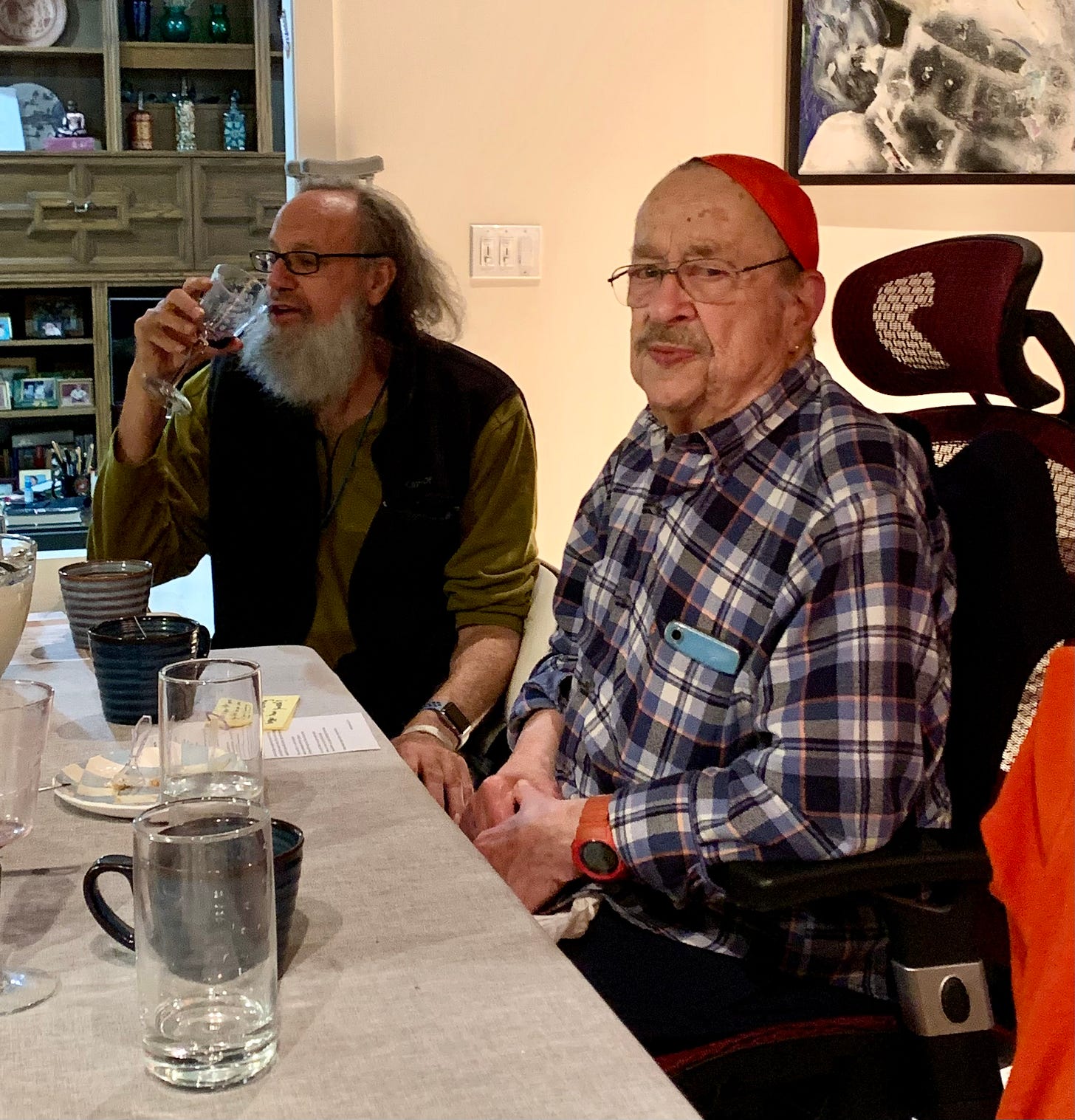Call Me By Your Name: The Forgotten Exodus
Sharing some Passover homework from my seder, and the Jewishness of André Aciman's "Call Me By Your Name."
A hearty post-Pesach hello!
I hope everyone had a meaningful and delicious Pesach, or as delicious as it could be. I discovered Diddles and Haggada chocolate chip cookies, so mine was pretty tasty, thanks for asking.
An intro for all the new friends here:
My name is Miranda! I’m a NYC Jewish professional and unprofessional, driven by curiosity, enthusiasm (which I refuse to curb), and connection to this beautiful ethnicity and religion. About a year and a half ago, I decided to blog about the journey, sharing Jewish joy weekly, and picked up some friends along the way (shoutout to Josh from Toronto with whom I just grabbed coffee!). I sometimes host events online and in person (be on the lookout for the annual Shavuot picnic and next book club). Anyway, thanks for reading. It means a lot!
Back to Pesach… we started a tradition in my family, as described in last year’s Passover Drop, where we require our guests to bring something that reminds them of any part of the Exodus story. This could be art, song lyrics, an object, story, etc. We go around the table and do a little show and tell. Again, people did not disappoint this year!
First, we had not one but two people compare the ten plagues to today’s climate crisis, with blood in the Nile representing plastics in the ocean, cattle disease and how cattle contribute to climate change, and death of the firstborn being death of our children. Yeah, it was a fun and uplifting seder!
Then someone brought a necklace he bought in the countryside of Portugal, where no local could explain what it was. So we took turns guessing. Some of us guessed it represented the stones of Jerusalem, while my mom thought it was a soccer ball.
This year, I learned the most from my dad (as usual). He spoke about how the movie, Call Me By Your Name, a coming-of-age romance between two young Jewish men, is the story of the second Exodus. What?? How?? Well, pass the charoset and I’ll tell you.
The film was adapted from the novel of the same name (so it could have been called ‘Call Me By the Book’s Name’… ugh such a dad joke, sorry) by André Aciman, an Italian-American writer raised in Alexandria, Egypt as a Sephardic Jew.
Yes! Aciman’s parents were of Turkish and Italian origin, from families that had settled in Alexandria in 1905. He grew up speaking French, Italian, Greek, Ladino, and Arabic. During increased tensions between Israel and Egypt, it was becoming unsafe for Jews to live there, and they had to flee Egypt in 1965, when Aciman was 14. He moved to Rome and eventually settled in New York City.
Aciman chronicles his picturesque life in Egypt before the exodus in his 1996 memoir, Out of Egypt, which ends with the family’s last Passover Seder before they say farewell to their beloved home.
Here’s some brief history from Manya Brachear Pashman, the co-host of AJC’s podcast, People of the Pod:
“Egypt did not just expunge its Jewish community. It managed to erase Jews from the nation’s collective memory. Only recently have people begun to rediscover the centuries of rich Jewish history in Egypt, including native Egyptian Jews dating back millennia.
In addition, Egypt became a destination for Jews expelled from Spain in the 15th Century. And after the Suez Canal opened in 1869, a wave of more Jews came from the Ottoman Empire, Italy, and Greece. And at the end of the 19th Century, Ashkenazi Jews arrived, fleeing from European pogroms.”
Call Me By Your Name is infused with details of Aciman’s life in Egypt more than I ever knew. I saw the film years ago and didn’t remember the characters were Jewish. Yet, the main character, Elio, grapples with his Jewishness just as much as his sexuality. Even the setting of the Italian Riviera is really supposed to be the coastal Alexandria of Aciman’s childhood.

Are the two exodus stories here different? Of course. It sounded like Aciman’s exodus was one of pain, like his family really didn’t want to leave. But the antisemitism was so bad that his family had to flee just as quickly as the ancient Israelites had.
Here’s a quote from the author himself:
“Eventually, one morning, or one afternoon, I came back from school. And my father said to me, ‘You know, they don't want us here anymore.’ Those were exactly the words he used. ‘They don't want us here.’ I said, ‘What do you mean?’ ‘Well, they've expelled us.’
And I was expelled with my mother and my brother, sooner than my father was. So, we had to leave the country. We realized we were being expelled, maybe in spring, and we left in May. And so, for about a month or so, the house was a mess because there were suitcases everywhere, and people. My mother was packing constantly, constantly. But we knew we were going to go to Italy, we knew we had an uncle in Italy who was going to host us, or at least make life livable for us when we arrived.”
These quotes are from an interview with Aciman on AJC’s podcast, The Forgotten Exodus, which features stories of Mizrahi Jews, the 800,000 people who left or were driven from their homes in Arab nations and Iran in the mid-20th century to forge new lives for themselves and their future generations. I don’t know about you, but this definitely makes me want to read the book and see the movie again! I can hear Sufjan Stevens now…
Here are some closing words from my dad:
“When we recall the Exodus at our Passover, we need also to remember the Second Exodus. This exodus came about when Israel became a state in 1948, and the Arab nations expelled Jews from their countries. Some 900,000 Jews were forced out or fled from their homes and in most cases were not allowed to take any of their possessions with them.
Thus, when we hear about the Palestinians who left their homes or were forced out when Arab nations attacked the new state of Israel, we should recall that as many if not more Jews were left homeless in this period of upheaval. Except they were not!
Arabs entered Arab nations and were put in refugee camps. Jews, forced out, went to the United States, or to Europe or to Israel, where in all cases they were taken in and became citizens.
Those Jews who fled of course do not seek to return, and no offer is made to compensate them for what had been stolen from them.
Thus, in this Second Exodus, Jews entered a new ‘promised land,’ and found freedom and the right to practice their beliefs whereas Arabs who left the area that had been called Palestine (not the original name) became refugees, stateless in lands belonging to other Arabs.”
And, for your enjoyment, here’s Fred (my dad) at the seder wearing his kippah that makes him look like the Pope with cousin Mike. Can you believe you get this kind of content for free?!
Shabbat Shalom and be well out there,






Great drop! Your family has wonderful traditions that I'm going to use as inspiration for my next seder. Here's one that my brother's family did: instead of sitting around the dining table, they converted used their living room. Adults sat on the sofas and kids were on floor cushions, and we converted the big ottoman into a dining table. It was a lot of fun and definitely felt different and special.
Great drop, great Seder, what was my poem - chopped liver? All joking and Jewish mother guilting aside, thank you Miranda for bringing Jewish joy (not referring to your friend in Mexico but her too) into our lives.